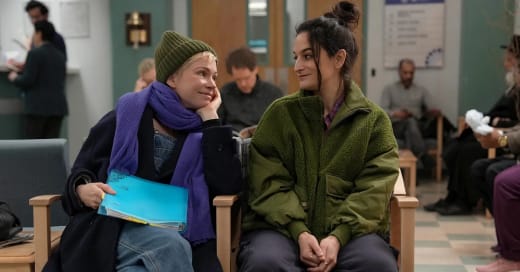About three episodes into the limited miniseries Dying For Sex (Disney+ here, Hulu elsewhere), I remembered that Michelle Williams’s character had died tragically young at the end of Dawson's Creek (this was more than twenty years ago, folks, so a spoiler warning is not in effect; do you also need to hear about that M*A*S*H chicken?).
I love Dawson's Creek with that passion I think you can only have for a show you grew up with, and wrote about its 20th anniversary a few years back here. I know there are teen-drama purists who will insist that the far-too-short, oh-the-potential My So-Called Life or Freaks and Geeks are better shows, but they do not have Pacey Witter, so.
Jen was not my favourite, initially - I mean, it’s Joey’s show, really - but I am always struck when revisiting how excellent Michelle Williams’s performance is. She’s older than the character she plays, as is fairly standard for teen characters, but not by much. She’s not just the glamorous blonde bitch (the Stacey McGill, if you like) from New York who turns up to get in the way of Joey getting her guy. She’s hurting, she’s struggling, but she’s also trying really, really hard. She wants to be happy. She doesn’t always get that happiness, and the ending does not treat her well - but oh, you feel for her, you really do.
There are clear similarities with the role she plays in Dying For Sex, which is based on the real-life Molly Kochan, and her podcast of the same name. (That the premise of the show - dying woman wants to have lots of kinky sex! - has its roots in a real person is a little reassuring, promising truth rather than just titillation.) Like Jen Lindley, Molly was “sexualised way too young”, experiencing abuse within the home at the age of seven; it’s shaped how she’s approached sex as an adult, and her capacity to let others in. Now she’s dying - breast cancer that has metastasised - and all she wants is to have sex. Kinky sex. Weird sex. Sex with strangers. To figure out what she wants, what she likes. To take ownership of her body while she still can.
It’s hard, I think, for it not to veer towards the sensational, but I don’t think it ever gets gratuitous - each sex scene we get in the show serves its own purpose, is its own thing, and there’s humour and drama and ridiculousness along the way. The American healthcare system - and there is a nod to how she has to stay on her ex-husband’s insurance - comes off surprisingly well, with an incredibly supportive palliative care specialist and an oncologist who warms up a little as the episodes go on. The ex-husband is suitably annoying and the new love interest, the neighbour, is pleasingly weird (I only copped on afterwards that it was Rob Delaney, who has written so movingly about losing a child to cancer, playing him, which brings a whole other level to it).
And then there’s Jenny Slate as the devoted best friend, slightly chaotic but committed to seeing this through - there’s a tenderness and warmth there that recalls Slate in Obvious Child (less so some of her other roles, which are more broadly comedic). The real Nikki is an executive producer on the show, and made the original podcast possible; I have not nosed too much into what bits might be true and what bits have been condensed or refined for the screen and the demands of an eight-part series, but it is not a saintly role (part comic relief with a couple of heartbreaking moments), which feels realer than one often gets in sad-cancer-stories.
But it is ultimately a chance for Michelle Williams to be fabulous and break our hearts all over again by dying too young (Sissy Spacek, always excellent, as her mother recalls the wrongness of the younger generation going first that we had with Grams at Jen’s bedside), though in this instance the focus is on her, her, her and not just the dying-person-as-source-of-wisdom-for-everyone-else’s-problems. Molly doesn’t become wise in the way that we might imagine, even though there’s arguably tremendous wisdom to how she chooses to spend her final days. She just gets to be Molly.
Anyway, if you feel like snorting with laughter and then howling hysterically into a pillow, this is worth watching. It is not perfect - I think almost every illness-related work omits some of the grosser elements and certainly tends towards having the patients be far more attractive than is plausible - and I am not sure I’d have gone for it if it hadn’t been for this particular cast, but good god I had a lot of feelings by the end of it.





I loved Dying for Sex while also finding it excruciating in parts and, ultimately, more heartbreaking than I was prepared for. Jenny Slate is incredible. The thing is, I'm not even sure if I'd recommend it? It was a great piece of art, of creativity, of storytelling… but I felt so raw afterwards that even reading about it feels difficult. Maybe that's the point of art, but for me, right now (newly postpartum, struggling with a lot of things going on in my own life), it wasn't the right televisual choice I don't think.
Jen = Stacey. ♥️